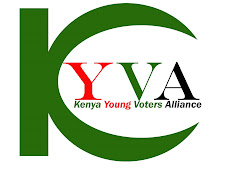KYVA is a conglomerate of organizations and individuals committed to ensuring that Kenya as a country manages to achieve set developmental goals to meet both the international and national targets. The idea was mooted by the (SONU) leadership of 2003/4. KYVA leadership is composed of diverse backgrounds and experiences. We urge all Kenyan youths to take charge of leadership at the counties and national levels. Register as voters and vote in large numbers for young visionary leaders.
Monday, February 7, 2011
VOTE OF NO CONFIDENCE AGAINST PM PREMISED ON WRONG REASONS.
The political marriage of convenience between certain legislators and their hitherto political nemeses has undeniably given them the numerical strength in the tenth Parliament. However, it is the manner in which these legislators intend to use their new found pact that is very much disconcerting.
First they threatened to impeach the House Speaker should his ruling regarding the constitutionality of the president`s controversial nominations go against their grains. Later own they threatened to pull out of the coalition government that they rightly accused of working at cross-purposes. On Friday last week, some legislators threatened to move a vote of no confidence against the PM for allegedly challenging the President`s “unfettered powers.”
While I acknowledge that moving a vote of no confidence against a leader of the PMs stature is the standard practice in many democracies around the world, I am also acutely aware of the fact that responsible Parliaments use this arsenal only with a view to checking on executive misconduct, or its effect, especially if the official`s unbecoming behavior subverts the structure of government or undermines the integrity of the office or the Constitution itself. In other words a vote of no confidence is only used if there is sufficient proof that a government official is behaving in a manner grossly incompatible with the proper function and purpose of the office. Secondly, it can also come in handy if such an official employs the power of his or her office for an improper purpose or for personal gain.
In Kenya such a threshold is seemingly non-existent. It may well be that a section of the political divide may invoke this power simply because they do not like one`s nose. This lacuna may seriously undermine the integrity of the office of the PM. Article 4(b) of the National Accord and Reconciliation Act, 2008, states that “the office of the Prime Minister shall become vacant if the National Assembly passes a resolution which is supported by a majority of all the members of the National Assembly, excluding the ex-officio members, and of which not less than seven days notice has been given, declaring that the National Assembly has no confidence in the Prime Minister.”
From the foregoing it is apparent that the grounds for the vote of no confidence are conspicuously missing hence leaving this crude weapon to become a matter of political expediency. Unfortunately, I can only compare the above scenario to that of monkey holding a loaded gun. In my view, the Prime Minister is simply supervising the implementation of the new constitution as per its letter and spirit.
It is his constitutional duty to reject any underhand deals that may jeopardize cohesiveness in our diverse ethnic society. I thought that it would have been the failure on his part not to jealously guard the new constitution against desecration that would have engendered a vote of no confidence against him and not the other way round. Moving a vote of no confidence against the PM based on seeming realities constructed on pure lies will most certainly prove counter-productive.
In any case, those bent on exploiting this provision must know that the Judiciary, the Constitution Implementation Commission (CIC), the LSK, civil society and the public at large have all declared the nomination exercise unconstitutional. Thus, if parliament wanted to badly move a censure motion it is the President and not the PM who should be the victim of such a censure.
At this juncture, it is important to remind those legislators deluding themselves that in the event of a vote of no confidence against the PM, the president can then move forth to form a Government of National Unity and continue to govern as though nothing happened. Such a move would be tantamount to formation of a government through a serious fraud since we have not forgotten the fact that there was no clear winner in the 2007 presidential elections. Furthermore such an illegality is likely to further heighten the tensions in the country.
Lastly our legislators must know that the reason why the country at large is protesting these unilateral nominations is because they do not pass the credibility test to warrant the Kenya Government to convince the UN Security Council for either a referral or deferral of the ICC cases against the six Kenyans. I therefore implore legislators to allow reason to prevail.
TOME FRANCIS,
BUMULA.
Subscribe to:
Comments (Atom)
